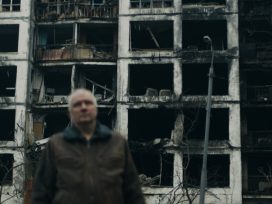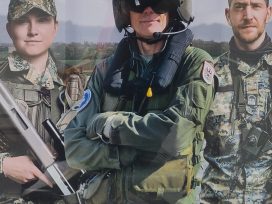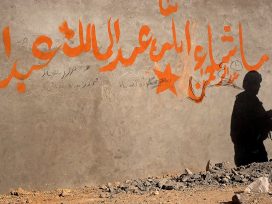Peace talking versus peace making
Ukraine denial is the root cause of Putin’s genocidal war. Since he is unwilling and unable to abandon this ideological obsession, talk of negotiations by western ‘peacemakers’ looks like an attempt to avoid responsibility.
The advance of the Ukrainian armed forces on the Russia-occupied territories in Autumn 2022, marked by a the liberation of the strategically and symbolically important city of Kherson in November, emboldened Ukraine supporters who demand more aid for the beleaguered country and believe that its victory, i.e., full recapture of lost territories, is increasingly feasible. On the other hand, the Ukrainian advance further unnerved the sceptics who have never got rid of their pinky idea of a ‘negotiated solution’ to the war in Ukraine as the only possible way out.
The optimists draw their arguments on a (perhaps naive) belief in international law, solidarity, commitment to the professed liberal-democratic values (freedom, dignity and sovereignty in particular), and increasingly on Ukraine’s resilience, civic unity and patriotic determination to wage the national liberation war as long as necessary.
The sceptics’ arguments greatly vary – from the initial disbelief in the capacity of Ukraine’s statehood and national unity, to more substantiated warnings on the inevitable ‘Ukraine fatigue’ at the prospect of an energy crisis and economic hardships, and ultimately to the apocalyptic vision of a nuclear Armageddon that Ukrainians may ‘provoke’ by unreasonable attempts to defend their sovereignty.
While western ‘Ukraine fatigue’ and Russian nuclear blackmail indeed are serious problems, the question is what the alternatives are. In other words, how can that coveted ‘diplomatic solution’ can be viably outlined and realistically implemented?
There have been no lack of calls for ‘peace negotiations’ but very few if any concrete proposals of possible compromises that could be acceptable for both sides. The reason is simple. The ultimate goal for Ukraine in this war is to defend its legitimate, internationally recognized borders and protect sovereignty, freedom, dignity and identity of its citizens. How can that be reconciled with the ultimate goal of Russia: to abolish international law, to occupy Ukrainian territory, eradicate Ukrainian identity, exterminate the Ukrainian elite, and to transform the remaining free citizens of the democratic nation into the voiceless slaves of a fascistoid despot?
What is the viable centre between these two projects where liberal Kyiv and totalitarian Moscow could compromise?
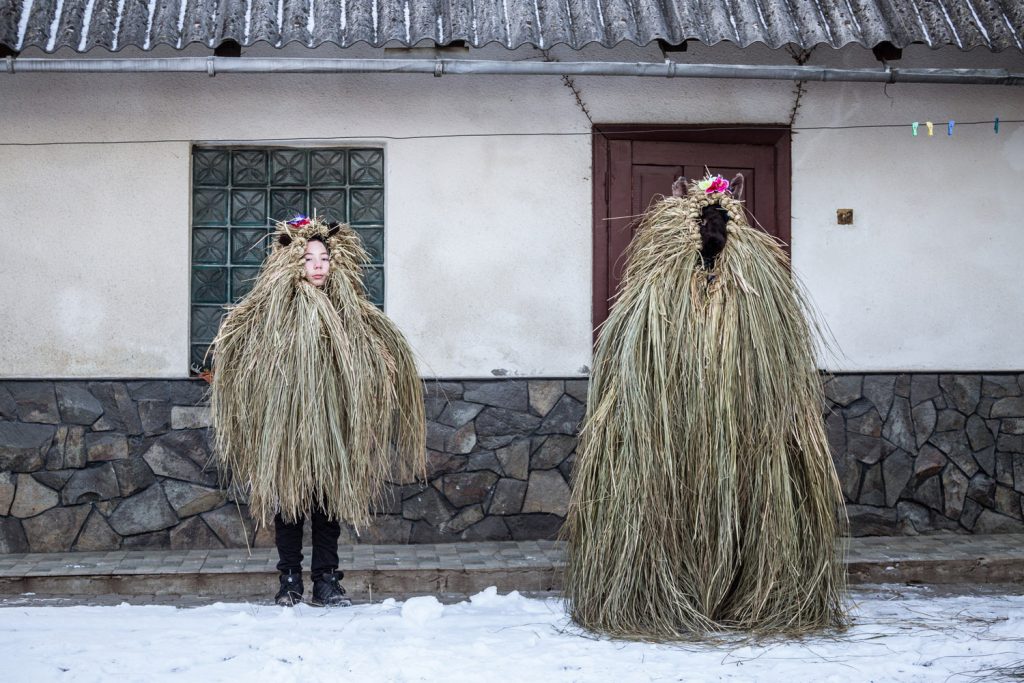
Ukraїner: The costumes of the Bears, the characters of Malanka, are made of bundles of sedge twisted into a knot. The costume of an adult character weighs 30-40 kilograms. Beleluya, Halychyna. January 2022. Photo: Artem Galkin.
War on status and identity
Classical peacemaking templates are not applicable here. This war is not about territory – Russia has occupied Crimea and part of the Donbas since 2014, but was not satisfied. It is not about security and the proverbial ‘NATO threat’: since 2012 Ukraine was officially a neutral (‘non-aligned’) country, like Finland, the Baltic states and Afghanistan when the Soviets invaded them. And it is certainly not about the mythical ‘Nazis’ and ‘oppressed’ Russophones. On the contrary: Russophones are the primary victims of Putin’s shelling today, while the ‘Nazis’ elected an (initially) pacifist and cosmopolitan, Russian-speaking Jew as president in 2019, removing his allegedly ‘ultra-nationalist’ predecessor Poroshenko in free and fair elections.
The war is first and foremost about status and identity. Russia is fighting the collective West, for which Ukraine is believed to be the proxy. Russia is fighting for equal status with the US – a status Russia thinks it is entitled to (with its duly assigned spheres of influence) but unjustly denied. Russia is fighting for a new world order where might makes right and brutal force and nuclear blackmail reigns supreme.
This is also a war about identity – about the perverse, paranoid, megalomaniac idea of ‘Russianness’ that originated in the 18th century and became embedded in the Russian mentality, its culture and imperial politics. Putin has not invented anything new, but merely developed that old ideology to its extreme, wrapping it in jingoistic rhetoric, and ultimately translating it into genocidal practices.
Ukraine had the bad luck to be the focus of that idée fixe, of Putin’s obsession. Russian imperial identity was created on the blatant appropriation of the history of Kyivan Rus, the territory of Ruthenia, and the identity of Ukrainians and Belarusians by a marginal Moscow tsardom at the north-eastern outskirts of historical Rus. It certainly had some dynastic, ecclesiastic and other connections with Kyiv, but the equation of 18th-century Muscovy with the medieval Kyivan Rus polity that disappeared in 1240 is nearly as nonsensical as the equation of modern Romania with ancient Rome.
Ukraine remained a dangerous witness of that historical theft, an insurmountable obstacle in the smooth appropriation of the Rus legacy. It was indeed an alien body in an otherwise wonderful mythical picture. That nuisance was wither to be absorbed and digested – or destroyed.
One need not be much of a specialist on Russia, Ukraine or Slavonic history – it is sufficient to read Putin’s quasi-historical treatises, or to listen to the venomous statements of his ideologues who angrily deny Ukraine’s right to exist. Doing so makes one understand both the underlying motives of the Russian aggression and its ultimate genocidal goal – to wipe Ukraine from the earth as a state and a nation.
In Putin’s Mein Kampf, Ukrainians are simply Russians who forgot who they were, and should therefore be forcibly returned to the Russian fold. Pliable subjects should be embraced and rewarded, the defiant ones ‘re-educated’, and the resistant species exterminated as incurable ‘nationalists’ or ‘Nazis’. In this perverted imago, Ukraine is proclaimed the ‘anti-Russia’ – an existential threat both to Russian identity and the Russian state. It is there doomed to annihilation.
Make peace is help Ukraine win
Putinists’ words and deeds leave no doubt about their intentions, and Ukrainians are perfectly aware of this. That is why nobody in Ukraine takes the idea of ‘negotiated solutions’ seriously. But the western ‘peacemakers’ still propose these unspecified ‘solutions’, apparently failing to recognize the level of Putin’s obsession with the ‘Ukrainian question’ – which is nearly as paranoid as Hitler’s obsession with Jews. In both cases, we perfectly know what the ‘final solution’ means.
Hence, the primary question that western ‘peacemakers’ should ask is about the Führer’s ideological obsession: is Putin able and willing to renege on his ‘Ukraine denial’, the root cause of his genocidal rhetoric and genocidal war? Until and unless this happens (and it will certainly not), all ‘diplomatic solutions’ are wishful thinking that indicate either the speaker’s belief in miracles or a frantic search for a gentle way to wash their hands of responsibility.
But even if it were to be abandoned by its partners, Ukrainians would continue to fight. What the western ‘peacemakers’ are likely to achieve in Ukraine by withdrawing their military aid is not the coveted peace, but more Russian terror and more mass graves like in Bucha, Izium, Mariupol and elsewhere.
The only way to make peace in Ukraine is to help Ukraine win. This might be a challenge, as the sceptics rightly point out. ‘Ukraine fatigue’ is a real threat. But it is up to western political leaders and opinion formers to communicate what the war is about: what is really at stake in historical and international terms, and minor the inconveniences for Europeans are compared to the ordeals that the Ukrainians are going through for the sake of what they believe are common values, common security and a common future.
The nuclear blackmail is a more complicated issue, since nobody can provide a hundred-percent guarantee that the besieged Russian forces in the Crimea would not employ a ‘tactical’ nuclear weapon as the last resort. But this, again, is a matter of communication: how clearly and persuasively will the western leaders will explain to Putin the direst consequences of his recklessness?
Putin is psychopathic but not suicidal – remember his panic reaction to COVID and his excessive, caricatured distancing measures. Besieged Crimea is not a besieged Moscow. In any case, there is no better alternative to countering nuclear blackmail. If we succumb to the blackmailer today, we will create a dangerous precedent for the future. We send a signal to all rogue states that aggression pays off, that war crimes go unpunished, and that nuclear saber-rattling can work. By giving in to the blackmailer we do not solve the problem but postpone and multiply it.
The sad truth that all peacemakers should realize is that Russia is ruled by a rogue regime, that can neither be talked to nor trusted. It means no reasonable negotiations are possible until the regime changes. This may not happen soon, but Ukrainians are determined to defend their country, their freedom and dignity as long as it takes. It would be neither morally fair nor politically wise to discourage them from resistance.
As UN secretary-general Antonio Gutteres has reiterated, we must support peace but ‘not any kind of peace – peace based on the values of the UN Charter, and peace based on international law’.
Published 24 February 2023
Original in English
First published by Raam op Rusland 14.11.2022
© Mykola Riabchuk / Raam op Rusland
PDF/PRINTIn collaboration with
In focal points
Newsletter
Subscribe to know what’s worth thinking about.
Related Articles

For those who suffered the consequences of Yalta’s division of Europe, the Helsinki Final Act brought grounds for optimism. Today, as Russia’s regressive war on Ukraine reopens old conflicts, it stands as a monument to European modernity.
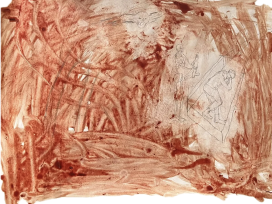
Artist Marharyta Polovinko’s creativity persisted in a tormented form through her experiences as a soldier on the Ukrainian frontline. The words of a recently called-up fellow creative and young family man provide a stark reminder that the Ukrainian military is buying Europeans time.

